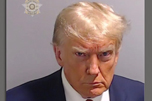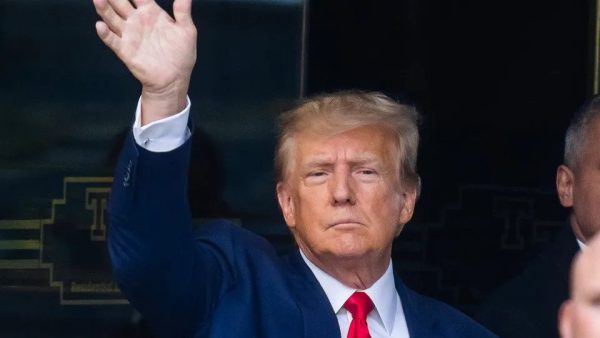Trump moves quickly
President Donald Trump’s first week was a busy one.
With the world watching, Donald Trump had a very busy first week as President of the United States. He was inaugurated on Friday, January 20th, and immediately hit the ground running trying to institute his new policies. With executive orders and accompanying tweets, he was the focal point of news coverage around the world.
Friday was Trump’s official swearing in as President of the United States. It was mostly a day of celebration and upholding the usual Presidential traditions. He started the day by attending mass at St. John’s Episcopal Church. This was followed by the brunch with the outgoing First Family, the Obama’s, and finally, the official inauguration ceremony.
After the inauguration, President Trump got to work issuing executive orders. He signed the paperwork that officially nominated his cabinet members, and issued an executive order that authorized federal agencies to “waive, defer, grant exemptions from, or delay the implementation” of any part of the Affordable Care Act that cost money for health care providers or individuals.

President Trump signing an executive order
He didn’t do much policy-wise during his first weekend as President but he and his administration were involved in some disputes with the media.
Trump, upset that the attendance of the women’s march on Saturday was greater than his inauguration, had Press Secretary Sean Spicer proclaim that the previous day’s inauguration was the best and biggest ever. This clearly wasn’t true as crowd pictures from Obama’s 2009 inauguration showed his crowd dwarfed Trump’s.
The next day, Kellyanne Conway claimed that Spicer had simply uttered “alternative facts” in relation to crowd sizes. The media took this statement as just another way of saying “lie” and proceeded to blister Conway.
“The Donald” fulfilled another campaign promise to start off Monday by withdrawing the United States from the Trans-Pacific Partnership agreement. Former President Obama was a huge advocate of the deal. His main goals in negotiating it were to try to increase trade in Asia, and hold China off militarily in their own backyard (China is not part of TPP). Trump had repeatedly called it a “bad deal” during his campaign.
Elder student Ben Siefke believes that Trump’s withdrawal from the TPP will be the most impactful of the executive orders he has already signed. Siefke said, “The withdrawal from the Trans-Pacific Partnership will be the most impactful. This is one of the promises that got Trump elected. He is a reaction to the Neoliberalist policies of the past 30 years and people are tired of it. This marks the shift away from the global economy.”
He also reinstated the Mexico City Abortion Policy which cuts all federal funds that go to foreign non-profit organizations if they perform or provide information about abortions for family planning.
His last order of business on Monday was to institute a hiring freeze for the federal government. This means that he stopped the hiring of all civilian workers for the federal government. However, he did make exceptions for military personnel and positions necessary to national security and public safety.
To start out Tuesday, he issued an executive order that approved of the construction of both the Keystone and Dakota Pipelines. He signed another mandate to speed up environmental reviews so he could receive approval on infrastructure projects.
Wednesday dealt strictly with matters involving immigration. Delivering upon his biggest campaign promise, Trump issued an executive order for the construction of a wall along the shared border with Mexico. He also ordered the hiring of 10,000 more Immigration and Customs Enforcement workers. He then ordered that federal grant money be withheld from sanctuary cities. These are cities that limit assistance to federal immigration authorities in most cases.
Lastly on Wednesday, he was interviewed for the first time as the President of the United States. The interview took place inside of the White House and involved topics such as the crowd size at his inauguration and the speculation of illegal votes counted in the election.
Thursday’s Trump watch was relatively quiet. The only significant news out of the White House was that a meeting with Mexican President Enrique Peña Nieto, scheduled for January 31st, was cancelled. Trump said that the meeting would be pointless if Nieto wasn’t willing to talk about paying for the proposed wall.
Friday was the most controversial day of the Donald Trump Presidency thus far. He signed an executive action putting new vetting measures into place and temporarily banning immigration from seven predominately Muslim countries. The countries temporarily banned were Iran, Iraq, Libya, Somalia, Sudan, Syria, and Yemen.
This ban was met with immediate backlash from Republicans and Democrats alike. Protests immediately broke out across the nation. Many people gathered at airports and in major U.S. cities.
Republican Senators John McCain and Lindsey Graham both said that they are against such a ban and that Trump’s administration didn’t talk much with the Department of Defense or Department of Homeland Security before instituting this policy.

It was a crazy first week for the United States under its new leader. When asked to summarize Donald Trump’s first week as President in one word, Elder’s resident government and economics expert, Mr. Gergen, said “rollercoaster.” Ben Siefke and Vince Feldman called it “chaotic” and “interesting” respectively.
I also asked Mr. Gergen whether the protests were more against the policies Trump has instituted so far or just against Trump himself. He said, “I think it’s a combination. I think it’s a combination of people seeing some of the policies coming here after the first week, and I see some people who either didn’t vote, or did vote and lost in the election, seeing that maybe we should’ve gotten more involved. They are saying buyer’s remorse, that maybe now I should be speaking up, which is too late in regards to the election, but maybe they’re announcing that within the next two years or the next four years, they are still going to be on the scene and learn from whatever they had experienced. So I do think it’s a combination of the election, as well as what has happened here in the last week.”
Siefke agrees with Mr. Gergen’s take that the backlash seems to be because of a combination of both the policies and the man himself. Feldman, on the other hand, stated that he thinks the backlash Trump has faced so far is more against him personally, than his policies.
If the first week of Donald Trump’s Presidency is any indication of what’s to come, the United States is in for a wild ride the next four years.

I'm a first-year writer for The Purple Quill. Big follower of all things cars, sports, rap music, and politics. "They misunderestimated me." - George...


















